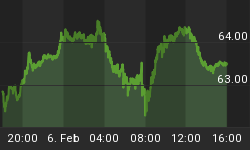With the S&P 500 Index and a number of other benchmark stock market indices flirting with cycle highs, I will be monitoring things very closely over the next few days to see if the market's overbought condition spells more downside potential than an expected consolidation. Or will the Index surprise us and fly trough the 1,151 area?
In addition to being overbought, the S&P 500 is also now expensively valued on a long-term cyclically adjusted PE (CAPE) basis, according to Robert Shiller, economics professor at Yale and author of, among others, Animal Spirits, Subprime Solution and Irrational Exuberance.
In order not to work with notoriously unreliable forward-looking earnings estimates, I have always preferred using Shiller's CAPE methodology, or normalised earnings, as they average ten years of earnings. This measure provides a good picture of the market's value regardless of where we are in the business cycle. I have therefore been updating a CAPE chart for a number of years. On this basis, the multiple has increased to 20.5 since the March low of 13.3, representing an overvaluation of 25.0% when compared to a long-term average of 16.4.

"Where breadth goes, the market usually follows," goes an old market saying. Breadth indicators are useful tools to assess the inner workings of the market's rallies or corrections, and are used to identify strength or weakness behind market moves, i.e. to assess how the bulls and the bears are exerting themselves.
One such measure is net new highs, calculated by subtracting the number of new 52-week lows from the number of new 52-week highs (see top pane in the chart below). This indicator often peaks before the price index, as was the case in January. It has also been falling sharply over the past few days. Is this again a precursor to a lower S&P 500 (bottom pane)?

Source: StockCharts.com
I stand by my summary in my Words from the Wise review on Sunday: Although the fat lady has not yet made her appearance to signal the end of the bull cycle, the steepness of the nascent rally, together with resistance in the area of the January highs, could result in stock markets consolidating in order to work off a short-term overbought condition. On the fundamental front, tighter money does not necessarily spell a declining stock market, but turning off the "juice" will certainly remove a tailwind, making earnings growth the key determinant for generating further gains (especially in light of stretched valuations).
Did you enjoy this post? If so, click here to subscribe to updates to Investment Postcards from Cape Town by e-mail.















